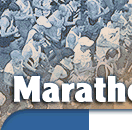


 |
  |
|
HOME -Marathon -Boston.com
NEWS
RUNNERS
EVENTS
THE COURSE
HISTORY
LINKS
CLASSIFIEDS
YELLOW PAGES
|
103rd BOSTON MARATHONThey've been down these roads beforeBy Michael Vega, Globe Staff, 04/20/99
The 51-year-old Rodgers had hoped to be the first American veteran to break the tape on Boylston Street but fell far short of the mark, dropping out of the race and becoming the first runner to check into a medical tent at the crest of Heartbreak Hill, suffering from dehydration and fatigue.
''He's an experienced runner,'' said Heather Aiello, a Red Cross spokeswoman. ''He knows when it's time to turn around.''
Fighting a head cold, Rodgers struggled mightily to reach the top of Heartbreak Hill. He plodded past the crest, then abruptly came to a stop. He did an about-face and walked into the tent set up on a grassy median at the intersection of Commonwealth Avenue and Hammond Street.
This was nearly the same spot where Rodgers had pulled out twice before - in his very first Boston Marathon in 1973 and again in 1977. In both instances, Rodgers recalled, heat played a factor. Yesterday, warm weather proved to be his undoing again.
''I was whipped,'' Rodgers said. ''I was getting lightheaded and I began to see flashing lights and I knew it was the first signs of dehydration. If I kept going, I would've collapsed. I would've keeled over.''
Rodgers did not want to risk that, even though it meant dropping out of a race he had won four times and abandoning his quest to break the over-50 course record (2:27:17), the over-50 record for an American (2:31:34), and the American over-50 record on a point-to-point course (2:25:46).
''I was on par for the record, and even had hit all my splits,'' said Rodgers, holding out a hand on which he had scrawled checkpoint times. ''But when I hit the 15-mile mark, that's when I felt like I hit the wall. For some reason, I've run so many hard marathons over the years, that ...''
Rodgers paused and blinked.
''It's just a tough event,'' he said. ''I've run 58 marathons and have had eight DNFs now, but the thing people don't realize is that Boston is the trickiest marathon to run in because of the course. Boston is one of the greatest challenges in the marathon.''
When he reached the 15-mile mark, Rodgers began to feel the effects of the weather. And he had not yet hit the hills of Wellesley and Newton.
''I felt tired,'' said Rodgers, who reached the half-marathon mark in 1:14. ''I ran a hard race a week before in the pouring rain and got a little bit of a cold and it left me, maybe, a little vulnerable.
''I can run the marathon, but I don't know if I can push hard for records. Maybe it's my body telling me that I'm getting old and I can't push that hard. I can still run the marathon, but I have to run it carefully.''
Gail Rodgers, Bill's wife, thought he made the right call.
''He looked very pale and I think he made a wise decision to drop out,'' she said. ''Bill knows himself quite well. He would never run himself into real trouble. He knows when to stop.
''I know he's going to be real disappointed. He trained so hard for this marathon. He trained as hard for this marathon, maybe harder, than for any marathon he's run. He was very serious about it. He was in very good shape. He probably just tried to do to much. He's going to be very disappointed.''
Asked if this would deter him from running next year, Rodgers said not at all.
''I think I'll run with my brother Charlie next year, and we'll cruise it, you know?'' he said. ''I've run 58 hard marathons, and I don't want the last one to be a DNF.''
Rodgers was soon joined in the medical tent by 50-year-old Joe Wargo of Falls Church, Va., who in his third Boston also was overcome by dehydration.
When Wargo spotted Rodgers conducting an interview, he held out his cap and asked for an autograph. Rodgers obliged.
''This is the best race I've ever dropped out of,'' Wargo said. ''I'm going to tell everybody I dropped out at the same spot as Bill Rodgers.''
Susan Bickelhaupt and John Vellante of the Globe Staff contributed to this report.
This story ran on page F04 of the Boston Globe on 04/20/99.
|
|